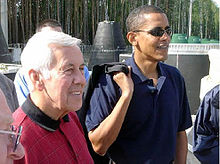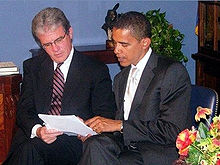Barack Hussein Obama II ( i /bəˈrɑːk huːˈseɪn oʊˈbɑːmə/; born August 4, 1961) is the 44th and current President of the United States. He is the first African American to hold the office. Obama previously served as a United States Senator from Illinois, from January 2005 until he resigned after his election to the presidency in November 2008.
i /bəˈrɑːk huːˈseɪn oʊˈbɑːmə/; born August 4, 1961) is the 44th and current President of the United States. He is the first African American to hold the office. Obama previously served as a United States Senator from Illinois, from January 2005 until he resigned after his election to the presidency in November 2008.
A native of Honolulu, Hawaii, Obama is a graduate of Columbia University and Harvard Law School, where he was the president of the Harvard Law Review. He was a community organizer in Chicago before earning his law degree. He worked as a civil rights attorney in Chicago and taught constitutional law at the University of Chicago Law School from 1992 to 2004.
Obama served three terms in the Illinois Senate from 1997 to 2004. Following an unsuccessful bid against a Democratic incumbent for a seat in the U.S. House of Representatives in 2000, he ran for United States Senate in 2004. [4] Several events brought him to national attention during the campaign, including his victory in the March 2004 Democratic primary and his keynote address at the Democratic National Convention in July 2004. He won election to the U.S. Senate in November 2004. His presidential campaign began in February 2007, and after a close campaign in the 2008 Democratic Party presidential primaries against Hillary Rodham Clinton, he won his party's nomination. In the 2008 general election, he defeated Republican nominee John McCain and was inaugurated as president on January 20, 2009.
As president, Obama signed economic stimulus legislation in the form of the American Recovery and Reinvestment Act in February 2009. Other domestic policy initiatives include the Patient Protection and Affordable Care Act, a major piece of health care reform legislation which he signed into law in March 2010, and the Dodd-Frank Wall Street Reform and Consumer Protection Act, which forms part of his financial regulatory reform efforts, which he signed in July 2010. In foreign policy, Obama gradually withdrew combat troops from Iraq, increased troop levels in Afghanistan, and signed an arms control treaty with Russia. On October 8, 2009, Obama was named the 2009 Nobel Peace Prize laureate.
Early life and career
Main article: Early life and career of Barack Obama
Obama was born August 4, 1961, at Kapi'olani Maternity & Gynecological Hospital in Honolulu, Hawaii.[5][6] His mother, Stanley Ann Dunham, was born in Wichita, Kansas, of mostly English, but also some German, descent.[7][8][9] His father, Barack Obama, Sr., was a Luo from Nyang’oma Kogelo, Nyanza Province, Kenya. Obama is the first President to have been born in Hawaii.[10][11] Obama's parents met in 1960 in a Russian language class at the University of Hawaii at Mānoa, where his father was a foreign student on scholarship.[12][13] The couple married on February 2, 1961,[14] but separated when Obama Sr. went to Harvard University on scholarship, and divorced in 1964.[13] Obama Sr. remarried and returned to Kenya, visiting Barack in Hawaii only once, in 1971. He died in an automobile accident in 1982.[15]After her divorce, Dunham married Indonesian student Lolo Soetoro, who was attending college in Hawaii. When Suharto, a military leader in Soetoro's home country, came to power in 1967, all Indonesian students studying abroad were recalled, and the family moved to the Menteng neighborhood of Jakarta.[16][17] From ages six to ten, Obama attended local schools in Jakarta, including Besuki Public School and St. Francis of Assisi School.[18][19]
In 1971, Obama returned to Honolulu to live with his maternal grandparents, Madelyn and Stanley Armour Dunham, and attended Punahou School, a private college preparatory school, from the fifth grade until his graduation from high school in 1979.[20] Obama's mother returned to Hawaii in 1972, remaining there until 1977 when she went back to Indonesia to work as an anthropological field worker. She finally returned to Hawaii in 1994 and lived there for one year, before dying of ovarian cancer.[21]

Barack Obama and half-sister Maya Soetoro, with their mother Ann Dunham and grandfather Stanley Dunham, in Hawaii (early 1970s)
Following high school, Obama moved to Los Angeles in 1979 to attend Occidental College.[27] In February 1981, he made his first public speech, calling for Occidental's divestment from South Africa.[27] In mid-1981, Obama traveled to Indonesia to visit his mother and sister Maya, and visited the families of college friends in India and Pakistan for three weeks.[27]
Later in 1981 he transferred to Columbia University in New York City, where he majored in political science with a specialty in international relations[28] and graduated with a B.A. in 1983. He worked for a year at the Business International Corporation,[29][30] then at the New York Public Interest Research Group.[31][32]
Political career: 1996–2008
State Senator: 1997–2004
Main article: Illinois Senate career of Barack Obama
Obama was elected to the Illinois Senate in 1996, succeeding State Senator Alice Palmer as Senator from Illinois's 13th District, which at that time spanned Chicago South Side neighborhoods from Hyde Park – Kenwood south to South Shore and west to Chicago Lawn.[47] Once elected, Obama gained bipartisan support for legislation reforming ethics and health care laws.[48] He sponsored a law increasing tax credits for low-income workers, negotiated welfare reform, and promoted increased subsidies for childcare.[49] In 2001, as co-chairman of the bipartisan Joint Committee on Administrative Rules, Obama supported Republican Governor Ryan's payday loan regulations and predatory mortgage lending regulations aimed at averting home foreclosures.[50]Obama was reelected to the Illinois Senate in 1998, defeating Republican Yesse Yehudah in the general election, and was reelected again in 2002.[51] In 2000, he lost a Democratic primary run for the U.S. House of Representatives to four-term incumbent Bobby Rush by a margin of two to one.[52]
In January 2003, Obama became chairman of the Illinois Senate's Health and Human Services Committee when Democrats, after a decade in the minority, regained a majority.[53] He sponsored and led unanimous, bipartisan passage of legislation to monitor racial profiling by requiring police to record the race of drivers they detained, and legislation making Illinois the first state to mandate videotaping of homicide interrogations.[49][54] During his 2004 general election campaign for U.S. Senate, police representatives credited Obama for his active engagement with police organizations in enacting death penalty reforms.[55] Obama resigned from the Illinois Senate in November 2004 following his election to the U.S. Senate.[56]
U.S. Senate campaign
In May 2002, Obama commissioned a poll to assess his prospects in a 2004 U.S. Senate race; he created a campaign committee, began raising funds and lined up political media consultant David Axelrod by August 2002, and formally announced his candidacy in January 2003.[57] Decisions by Republican incumbent Peter Fitzgerald and his Democratic predecessor Carol Moseley Braun not to contest the race launched wide-open Democratic and Republican primary contests involving fifteen candidates.[58] In the March 2004 primary election, Obama won in an unexpected landslide—which overnight made him a rising star within the national Democratic Party, started speculation about a presidential future, and led to the reissue of his memoir, Dreams from My Father.[59]In July 2004, Obama delivered the keynote address at the 2004 Democratic National Convention in Boston, Massachusetts,[60] and it was seen by 9.1 million viewers. His speech was well received and elevated his status within the Democratic Party.[61]
Obama's expected opponent in the general election, Republican primary winner Jack Ryan, withdrew from the race in June 2004.[62] Six weeks later, Alan Keyes accepted the Illinois Republican Party's nomination to replace Ryan.[63] In the November 2004 general election, Obama won with 70% of the vote.[64]
U.S. Senator: 2005–2008
Main article: United States Senate career of Barack Obama

Obama delivering a speech at the University of Southern California, on October 28, 2006.
Legislation
Obama cosponsored the Secure America and Orderly Immigration Act.[73] He introduced two initiatives bearing his name: Lugar–Obama, which expanded the Nunn–Lugar cooperative threat reduction concept to conventional weapons,[74] and the Coburn–Obama Transparency Act, which authorized the establishment of USAspending.gov, a web search engine on federal spending.[75] On June 3, 2008, Senator Obama, along with Senators Thomas R. Carper, Tom Coburn, and John McCain, introduced follow-up legislation: Strengthening Transparency and Accountability in Federal Spending Act of 2008.[76]Obama sponsored legislation that would have required nuclear plant owners to notify state and local authorities of radioactive leaks, but the bill failed to pass in the full Senate after being heavily modified in committee.[77] Regarding tort reform, Obama voted for the Class Action Fairness Act of 2005 and the FISA Amendments Act of 2008, which grants immunity from civil liability to telecommunications companies complicit with NSA warrantless wiretapping operations.[78]

Obama and U.S. Sen. Richard Lugar (R-IN) visit a Russian mobile launch missile dismantling facility in August 2005.[79]
Later in 2007, Obama sponsored an amendment to the Defense Authorization Act adding safeguards for personality disorder military discharges.[84] This amendment passed the full Senate in the spring of 2008.[85] He sponsored the Iran Sanctions Enabling Act supporting divestment of state pension funds from Iran's oil and gas industry, which has not passed committee, and co-sponsored legislation to reduce risks of nuclear terrorism.[86] Obama also sponsored a Senate amendment to the State Children's Health Insurance Program providing one year of job protection for family members caring for soldiers with combat-related injuries.[87]
Committees
Obama held assignments on the Senate Committees for Foreign Relations, Environment and Public Works and Veterans' Affairs through December 2006.[88] In January 2007, he left the Environment and Public Works committee and took additional assignments with Health, Education, Labor and Pensions and Homeland Security and Governmental Affairs.[89] He also became Chairman of the Senate's subcommittee on European Affairs.[90] As a member of the Senate Foreign Relations Committee, Obama made official trips to Eastern Europe, the Middle East, Central Asia and Africa. He met with Mahmoud Abbas before Abbas became President of the Palestinian Authority, and gave a speech at the University of Nairobi condemning corruption within the Kenyan government.[91]Copyright : www.wekipedia.org














0 komentar:
Post a Comment